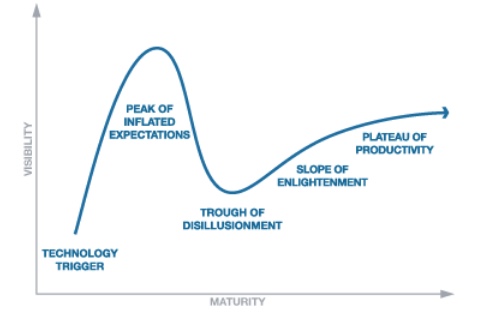Learning Analytics and the Peak of Inflated Expectations
 Has Learning Analytics dropped of the peak of inflated expectations in Gartner’s hype cycle? According to Educause ‘Understanding the power of data’ is still there as a major trend in higher education and Ed Tech reports a KPMG survey which found that 41 percent of universities were using data for forecasting and predictive analytics.
Has Learning Analytics dropped of the peak of inflated expectations in Gartner’s hype cycle? According to Educause ‘Understanding the power of data’ is still there as a major trend in higher education and Ed Tech reports a KPMG survey which found that 41 percent of universities were using data for forecasting and predictive analytics.
But whilst many universities are exploring how data can be used to improve retention and prevent drop outs, there seems little pretence any more that Learning Analytics has much to do with learning. The power of data has somehow got muddled up with Management Analytics, Performance Analytics and all kinds of other analytics – but the learning seems to have been lost. Data mining is great but it needs a perspective on just what we are trying to find out.
I don’t think Learning analytics will go into the trough of despair. But i think that there are very real problems in working out how best we can use data – and particularly how we can use data to support learning. Learning analytics need to be more solidly grounded in what is already known about teaching and learning. Stakeholders, including teachers, learners and the wider community, need to be involved in the development and implementation of learning analytics tools. Overall, more evidence is needed to show which approaches work in practice and which do not.
Finally, we already know a great deal about formal learning in institutions, or at least by now we should do. Of course we need to work at making it better. But we know far less about informal learning and learning which takes place in everyday living and working environments. And that is where I ultimately see Learning analytics making a big difference. Learning Analytics could potentially help us all to self directed learners and to achieve the learning goals that we set ourselves. But that is a long way off. Perhaps if Learning analytics is falling off the peak of expectations that will provide the space for longer term more clearly focused research and development.
